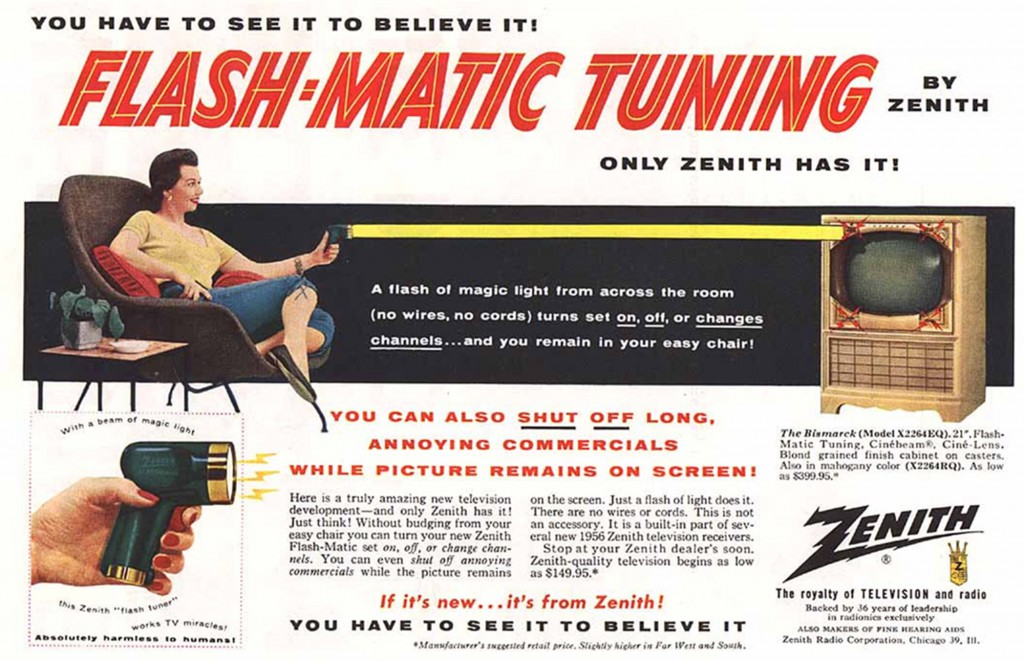The first class discussion & lecture of the Civic Media course began with the suitably vague title Technologies of Control and Desire. The purpose of this lecture was to introduce technology into the discussion of ethics and communication. The idea was to talk about the ways in which technologies have been seen both as a source of salvation and as a threat to the society in which they are introduced.
Unsurprisingly, in my eagerness I forgot to talk about the first slide which was a advertisement for an early television remote control.
 Often the invention of the remote control is credited to Eugene Polley (1915 – 2012) it was an invention that had to happen. People didn’t want to have to stand up to change the channel. What we tend not to think about is that the invention of the remote control allowed for many changes. Thousands of channels would not be able to compete or exist without a remote control. Also advertising was forced to adapt once people could effortlessly change channels or lower the volume. Eugene Polley didn’t create the couch potato but he certainly made life easier for this group.
Often the invention of the remote control is credited to Eugene Polley (1915 – 2012) it was an invention that had to happen. People didn’t want to have to stand up to change the channel. What we tend not to think about is that the invention of the remote control allowed for many changes. Thousands of channels would not be able to compete or exist without a remote control. Also advertising was forced to adapt once people could effortlessly change channels or lower the volume. Eugene Polley didn’t create the couch potato but he certainly made life easier for this group.
The first section of the presentation was a very, very brief introduction to technology ethics in order to arrive at the discussion of whether we have free choice or not. Are we choosing to do what we do based on ethical decision making? Or maybe on chance? Or maybe something else? What is the role of technology in forming our worlds and “assisting” our choices.
I included a quote from the composer Stravinsky
In America I had arranged with a gramophone firm to make some of my music. This suggested the idea that I should compose something whose length should be determined by the capacity of the record.
This is a nice illustration where art is no longer necessarily a choice of the creator but rather a decision based on technological limitations. Keeping on the theme of technology I also introduced the idea of technology enabling us to act – or to put it more extremely – technology “forcing” us to act.
To illustrate this I showed them the web page for the iPod Classic which has the line “Your top 40 000”. This refers to the capacity of the device to store 40 000 songs. But how would someone go about collecting so much music? Could it be done legally? Or does this tagline implicitly encourage piracy?
From this point I introduced technological determinism and the idea of choice. Without refuting that we always have choice I gave examples of social and technological mass choices that seem to indicate a high level of determinism.
From this position I pointed out that the way in which technology is accepted depends on the way in which we see it either as a threat or a benefit to our lifestyle. Using weird and wonderful advertisements and technical articles from the past I demonstrated a utopian vision where farmers work from home, students learn without reading and asthma is cured with cigarettes.
In order to demonstrate techno-pessimism I used quotes from Plato (against writing), a snippet against books from Johannes Trithemius’ (1494) In Praise of Scribes
The word written on parchment will last a thousand years. The printed word is on paper. How long will it last? The most you can expect a book of paper to survive is two hundred years.
Referencing social media I pointed at George M Beard’s (1881) concern that newspapers and telegraph create nervous disorders by exposing people to “the sorrows of individuals everywhere”
In closing I reminded the audience of Postman’s comparison between Orwell and Huxley’s visions of the future: Orwell was concerned that we would be oppressed by a technology wielding state. Huxley was concerned that we would all be sucked into the shallow pleasures offered by technology. I pointed out that it has become popular to say Huxley has “won” because social media seems to be people settling for shallow pleasures. However, this is not entirely true and states are increasingly using Orwellian means to control those who would engage in deeper discussions that threaten the state.
I finished off with a short video of Morosov’s work (which can be found online here) and a class discussion. The slides I used for the class are online here